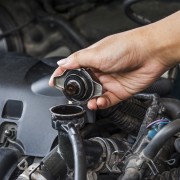Even if you're not car savvy – and most of us aren't – car alternator trouble is easier to spot than you may realize. Here are the most important things to look for.
- Browse Categories
- All Tips
-
Home & Garden
- All
- Appliances
- Bathroom
- Cleaning
- Crafts
- Decorating
- Electrical
- Flooring
- Furniture
- Garage Door
- Gardening
- Green Living
- Heating
- Home Alarm Systems
- Home Maintenance
- Home Remedies
- Home Security
- Home Staging
- House Sitting
- Junk Removal
- Kitchen
- Lawn Care
- Lock Systems
- Moving
- Outdoor Living
- Pest Control
- Plumbing
- Renovation
- Roofing
- Snow Removal
- Storage
- Tools
- Tree Service
- Health
- Family
- Travel
- Auto
- More Tips

Signs your car's alternator is in trouble
September 20, 2014

Your car’s alternator is critical to the function of your car; it's what recycles the battery power you use while you’re driving to your battery—which makes sure the battery doesn’t die.
- Simply put, without a functioning alternator, your car won’t work.
Knowing the signs of a failing car alternator – before your car actually stalls on the road – is extremely useful. So, what are they?
The warning light comes on
In most cars built within the last decade or so, there’s a battery-shaped warning light that comes on to signal an issue with the car’s alternator.
- This light is connected to the computer system that monitors alternator output. You may notice it either flicker or come on and stay on, signalling there’s a problem with the alternator output levels.
- Similarly, you may notice it light up when you use some of your car's electrical accessories, which increase your car's need for electrical power.
Dim vehicle lights and sluggish electrical systems
The car alternator is responsible for supplying the electrical needs of the car.
- If it’s beginning to fail, you may notice weak interior and/or exterior lights.
- Other signs include a digital speedometer that stops working and other electricity-supplied accessories—like power windows or heated seats—slowing down.
Weak or dead battery
Batteries don’t last forever, but a failing alternator can make them seem like they’ve given up before their time.
- If your car’s battery is dead and you want to find out if the battery or the alternator is to blame, charge up the battery. Jumper cables and a nearby working car will do for that. Then try to turn the car on.
- If the car has trouble starting even with a fully charged battery, your alternator is likely to blame.
Strange smells or sounds
When alternators weaken, the components they supply are impacted.
- If the belts that are connected to the alternator don’t turn freely, the extra friction causes the belts to heat up and smell like burning rubber.
- You might also notice strange noises. Parts that don’t turn well or have become worn can produce whining or grinding noises.
Testing your alternator
If you notice odd smells or sounds, it’s time to have your car checked out.
- If you are relatively handy, you can check the alternator yourself with a voltmeter, also called a DVOM (or digital volt ohmmeter. If you're unsure, visit your local garage and ask a mechanic to do the job for you.
- Turn your engine off and connect its leads to your car battery. The red lead to the positive post and the black lead to to the negative post.
- Set the voltmeter to DC volts if it isn't already. You should get a reading higher than 12.65 volts.
- Next, take off the leads, turn the car on and carefully reconnect the leads, making sure to keep them free of the belt or engine.
- Now the reading should be right around 14 volts.
- If it's not, there's a chance your alternator might need replacement.






